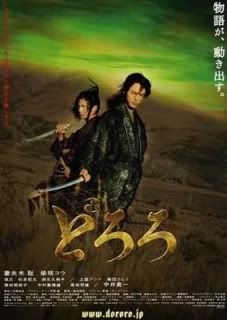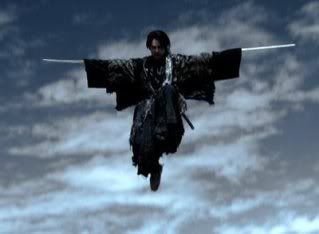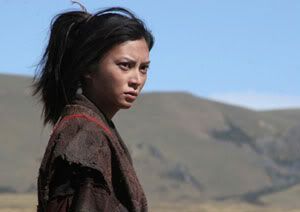
Back home in Japan, the late Osamu Tezuka was known as the God of Manga and you don't get a title like that without being one helluva storyteller.
Tezuka-san's stories have followed me all of my life and I am a better person for it. As I child and later as a teenager, I yearned for respect much like Kimba the White Lion and as a father I have pondered the mistakes of Professor Tenma from Astro Boy and have learned the true value of fatherhood and will always appreciate the blessings that come with raising a child.
In 2006, I heard that Dororo was going to be made into a feature length film. That bothered me because I wasn't terribly sure how well Tezuka would translate into live-action. The animated versions of Astro Boy and Kimba the White Lion were entertaining enough kiddie fare, but they really weren't allowed to explore the depths that Tezuka did in the manga.
As a motion picture, Dororo has quite a bit going for it but it suffers from some of the same issues that Blood: The Last Vampire did.

Tezuka-san's stories have followed me all of my life and I am a better person for it. As I child and later as a teenager, I yearned for respect much like Kimba the White Lion and as a father I have pondered the mistakes of Professor Tenma from Astro Boy and have learned the true value of fatherhood and will always appreciate the blessings that come with raising a child.
In 2006, I heard that Dororo was going to be made into a feature length film. That bothered me because I wasn't terribly sure how well Tezuka would translate into live-action. The animated versions of Astro Boy and Kimba the White Lion were entertaining enough kiddie fare, but they really weren't allowed to explore the depths that Tezuka did in the manga.
As a motion picture, Dororo has quite a bit going for it but it suffers from some of the same issues that Blood: The Last Vampire did.

The actual premise of Dororo is quite fascinating and seems to take cues from nearly every Shakespearian or Greek tragedy worth its salt.
The tale begins in feudal Japan with the warlord Kagemitsu Daigo (Kiichi Nakai) suffering a horrible military defeat. Kagemitsu seeks shelter in a remote temple and in his rage and despair, makes a pact with 48 evil spirits. He agrees to give each spirit (referred to as a demon in the English subtitles but more in flavor with the yōkai of traditional folklore than the demonic oni) permission to take one of the body parts of his unborn son in exchange for dominion over his enemies.
As a result, Kagemitsu's son is born with no limbs or facial features to speak of. In despair, Kagemitsu's wife sets their child adrift along a river in a style befitting Moses of Old Testament fame and the child is eventually plucked from the jaws of death by Dr. Honma (Yoshio Harada, whom some will recognize from Rônin-gai and the Christopher Lambert ninja vehicle, The Hunted).
Honma is no ordinary doctor; he specializes in alchemy and in yet another Tezuka plot device inspired by Frankenstein, Honma roams the country side and collects the dead bodies of children butchered in village raids during Kagemitsu's return to power. Honma then distills the corpses and uses the essence to create prosthetic devices that will allow Kagemitsu's heir apparent to function as a normal human being.
But Honma doesn't stop there. His final procedure gives the child use of a pair of magical swords grafted to his forearms and hidden away by his prosthetic hands. Eventually, the yōkai track the child down and kill Dr. Honma while trying to eliminate Kagemitsu's heir and then the story begins in earnest as Kagemitsu's heir (who eventually earns the name "Hyakkimaru" and is played by heartthrob, Satoshi Tsumabuki) embarks on a quest to kill the 48 yōkai and regain his lost humanity.
The hitch being that every time Hyakkimaru kills a yōkai, part of him returns to flesh and blood. As he regains his humanity, Hyakkimaru loses the invulnerability and preternatural ability afforded to him by his magical prosthetics.
If you're thinking, "So it is like a jidai-geki version of Edward Scissorhands," you would not be too far off of the mark.
The titular "Dororo" (Kou Shibasaki) is a tough yet sensitive ingénue thief who runs afoul of Hyakkimaru while he is in pursuit of a jorōgumo (a type of yōkai who can take the shape of a beautiful woman, but whose true form is that of a monstrous spider) which claimed one of Hyakkimaru's legs as its price for lending its aid to Kagemitsu.
Like Hyakkumaru, Dororo "earns" her name rather than simply being born with one. She remains unfazed by the fact that Hyakkimaru is actually insulting her when he refers to her as "Dororo" (which supposedly means "little monster") or perhaps she doesn't care. It seems a small price to pay in exchange for a life of danger and excitement.
The rest of the film alternates through several misadventures with a portion of the other yōkai and concludes with the inevitable showdown between Hyakkimaru and his father, Kagemitsu.

The tale begins in feudal Japan with the warlord Kagemitsu Daigo (Kiichi Nakai) suffering a horrible military defeat. Kagemitsu seeks shelter in a remote temple and in his rage and despair, makes a pact with 48 evil spirits. He agrees to give each spirit (referred to as a demon in the English subtitles but more in flavor with the yōkai of traditional folklore than the demonic oni) permission to take one of the body parts of his unborn son in exchange for dominion over his enemies.
As a result, Kagemitsu's son is born with no limbs or facial features to speak of. In despair, Kagemitsu's wife sets their child adrift along a river in a style befitting Moses of Old Testament fame and the child is eventually plucked from the jaws of death by Dr. Honma (Yoshio Harada, whom some will recognize from Rônin-gai and the Christopher Lambert ninja vehicle, The Hunted).
Honma is no ordinary doctor; he specializes in alchemy and in yet another Tezuka plot device inspired by Frankenstein, Honma roams the country side and collects the dead bodies of children butchered in village raids during Kagemitsu's return to power. Honma then distills the corpses and uses the essence to create prosthetic devices that will allow Kagemitsu's heir apparent to function as a normal human being.
But Honma doesn't stop there. His final procedure gives the child use of a pair of magical swords grafted to his forearms and hidden away by his prosthetic hands. Eventually, the yōkai track the child down and kill Dr. Honma while trying to eliminate Kagemitsu's heir and then the story begins in earnest as Kagemitsu's heir (who eventually earns the name "Hyakkimaru" and is played by heartthrob, Satoshi Tsumabuki) embarks on a quest to kill the 48 yōkai and regain his lost humanity.
The hitch being that every time Hyakkimaru kills a yōkai, part of him returns to flesh and blood. As he regains his humanity, Hyakkimaru loses the invulnerability and preternatural ability afforded to him by his magical prosthetics.
If you're thinking, "So it is like a jidai-geki version of Edward Scissorhands," you would not be too far off of the mark.
The titular "Dororo" (Kou Shibasaki) is a tough yet sensitive ingénue thief who runs afoul of Hyakkimaru while he is in pursuit of a jorōgumo (a type of yōkai who can take the shape of a beautiful woman, but whose true form is that of a monstrous spider) which claimed one of Hyakkimaru's legs as its price for lending its aid to Kagemitsu.
Like Hyakkumaru, Dororo "earns" her name rather than simply being born with one. She remains unfazed by the fact that Hyakkimaru is actually insulting her when he refers to her as "Dororo" (which supposedly means "little monster") or perhaps she doesn't care. It seems a small price to pay in exchange for a life of danger and excitement.
The rest of the film alternates through several misadventures with a portion of the other yōkai and concludes with the inevitable showdown between Hyakkimaru and his father, Kagemitsu.

There is a part of me that really wants to fall in love with this movie. The dynamic between Hyakkimaru and Dororo is interesting as they both take turns protecting and mentoring one another. Dororo teaches Hyakkimaru what it is to be human, while Hyakkimaru has to teach Dororo that there is more to appreciate about life other than material wealth.
Dororo finds that lesson insulting as Hyakkimaru is protected from the hardships of poverty. As a homunculus of sorts, Hyakkimaru doesn't need to eat, so he can't appreciate how horrible it is to go hungry. Should Hyakkimaru succeed in killing Kagemitsu, he'll be the heir to Kagemitsu's throne so Hyakkimaru can't appreciate what it is to be poor.
The problem that plagues Dororo is the same one that plagues the previously mentioned (and reviewed) Blood: The Last Vampire and that is laughable special effects. The yōkai in the movie alternately are represented by actors in ridiculous costumes, cringe-inducing models, or some of the most underwhelming CGI since The Mummy Returns. It really is regrettable that such a potentially powerful story is undermined by this technical issue.
The yōkai are a key element of the plotline so you'd think that they'd be presented in a manner proportionate to their relative importance to the story. They don't necessarily have to be so terrifying as to generate nightmares, but you'd hope that a respectable part of the budget would be spent making the yōkai as impressive as possible.
But, we're talking about Japan here; the nation who made an art form out of guys dressed in rubber lizard suits smashing their way though cardboard mock-ups of Tokyo.
The unintentional humor injected in the story by the chuckle-worthy yōkai provides moments of levity which serve the admirable purpose of keeping Dororo from collapsing under the weight of absolute despair (there are some scenes in the movie which are genuinely touching) but even so, it'd be nice if the yōkai provided a bit more menace.
I'm not so dense as not to recognize deliberate camp when I see it. I just think that the profound parts of this movie serve us better than the humorous ones. Dororo is a tale of the struggle between the giving of one's self versus the sacrifice of others to serve one's own selfish desires and that is a timeless morale that everyone should try to appreciate.

Dororo finds that lesson insulting as Hyakkimaru is protected from the hardships of poverty. As a homunculus of sorts, Hyakkimaru doesn't need to eat, so he can't appreciate how horrible it is to go hungry. Should Hyakkimaru succeed in killing Kagemitsu, he'll be the heir to Kagemitsu's throne so Hyakkimaru can't appreciate what it is to be poor.
The problem that plagues Dororo is the same one that plagues the previously mentioned (and reviewed) Blood: The Last Vampire and that is laughable special effects. The yōkai in the movie alternately are represented by actors in ridiculous costumes, cringe-inducing models, or some of the most underwhelming CGI since The Mummy Returns. It really is regrettable that such a potentially powerful story is undermined by this technical issue.
The yōkai are a key element of the plotline so you'd think that they'd be presented in a manner proportionate to their relative importance to the story. They don't necessarily have to be so terrifying as to generate nightmares, but you'd hope that a respectable part of the budget would be spent making the yōkai as impressive as possible.
But, we're talking about Japan here; the nation who made an art form out of guys dressed in rubber lizard suits smashing their way though cardboard mock-ups of Tokyo.
The unintentional humor injected in the story by the chuckle-worthy yōkai provides moments of levity which serve the admirable purpose of keeping Dororo from collapsing under the weight of absolute despair (there are some scenes in the movie which are genuinely touching) but even so, it'd be nice if the yōkai provided a bit more menace.
I'm not so dense as not to recognize deliberate camp when I see it. I just think that the profound parts of this movie serve us better than the humorous ones. Dororo is a tale of the struggle between the giving of one's self versus the sacrifice of others to serve one's own selfish desires and that is a timeless morale that everyone should try to appreciate.

Oh, and don't get me wrong. I wouldn't have watched this movie if not for the promise of a swordfight or two and Ching Siu-Tung's over-the-top action scenes help smooth over some of the rankled feathers raised by the CGI. There is ample bloodshed that will easily satisfy your inner gore hound.
It should probably go without saying but Hyakkimaru only tracks down about half of the yōkai during the course of this particular movie, so the promise of sequels is out there. I'd actually like to see how the tale (and the relationship between Dororo and Hyakkimaru) progresses, so here's hoping that a follow-up film comes out very soon.
It should probably go without saying but Hyakkimaru only tracks down about half of the yōkai during the course of this particular movie, so the promise of sequels is out there. I'd actually like to see how the tale (and the relationship between Dororo and Hyakkimaru) progresses, so here's hoping that a follow-up film comes out very soon.










No comments:
Post a Comment